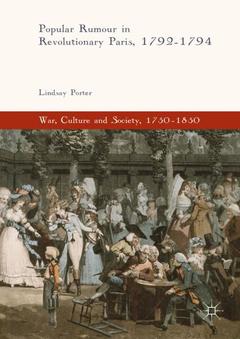Popular Rumour in Revolutionary Paris, 1792-1794, Softcover reprint of the original 1st ed. 2017 War, Culture and Society, 1750–1850 Series
Langue : Anglais
Auteur : Porter Lindsay

This book examines the impact of rumour during the French Revolution, offering a new approach to understanding the experiences of those who lived through it. Focusing on Paris during the most radical years of the Jacobin republic, it argues that popular rumour helped to shape perceptions of the Revolution and provided communities with a framework with which to interpret an unstable world.
Lindsay Porter explores the role of rumour as a phenomenon in itself, investigating the way in which the informal authority of the ?word on the street? was subject to a range of historical and contemporary prejudices. Drawing its conclusions from police reports and other archival sources, this study examines the potential of rumour both to unite and to divide communities, as rumour and hearsay began to play an important role in defining and judging personal commitment to the Revolution and what it meant to be a citizen.
Chapter I. Introduction.- Chapter II. ‘Prenez garde Citoyens!’: Policing Popular Rumour.-Chapter III. ‘Un bruit de frayeur se répand’: Informal Communication Networks and the Creation of Rumour.- Chapter IV. Rumour, Riots, Feasts and Famines.- Chapter V. Rumour and Community: Solidarity and Conflict in the Sans-Culotte Neighbourhoods of Year II.- Chapter VI. Rumour, Reputation and Identity.- Chapter VII. Rumour, Denunciation and Terror.-Chapter VIII. Conclusion.- Archival Sources.- Index.
Lindsay Porter is the author of Who are the Illuminati? (2005) and Assassination: A Political History (2010), both of which were translated into several languages. She also contributed to Conspiracy Theories in American History: An Encyclopedia (2001). Her current research interests are in popular rumour and public opinion in the eighteenth century.
Examines how rumour shaped perceptions of the French Revolution Analyses the role of rumour in community life, through a range of police reports and archival source Explores how these narratives enabled communities to interpret current events through familiar language and imagery Includes supplementary material: sn.pub/extras Includes supplementary material: sn.pub/extras
Date de parution : 01-2018
Ouvrage de 267 p.
14.8x21 cm
Date de parution : 03-2019
Ouvrage de 267 p.
14.8x21 cm
Thèmes de Popular Rumour in Revolutionary Paris, 1792-1794 :
Mots-clés :
Jacobinism; French Revolution; soft power; Terror; citizenship
© 2024 LAVOISIER S.A.S.



